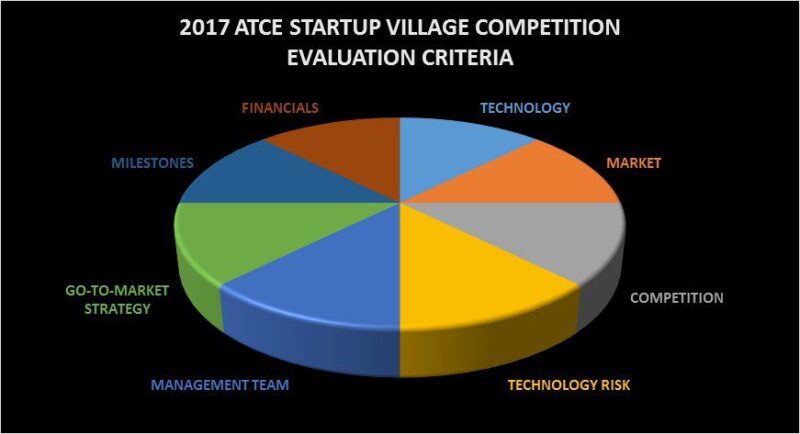The Society of Petroleum Engineers (SPE) and the Rice University Alliance for Technology and Entrepreneurship are teaming up to host a competition showcasing emerging energy technology companies at the SPE Annual Technical Conference and Exhibition (ATCE). For the first time, newly formed companies will compete for potential partnerships and prize money at the Energy Startup Competition, part of the ATCE Startup Village.
The competition will take place on Tuesday, 10 October, in Room 006 A–C at the Henry B. Gonzalez Conference Center. Admittance to the Startup Village is included with ATCE registration. Presentations for the Energy Startup Competition will be no longer than 8 minutes apiece, with a 6-minute question and answer session from the judging panel.
The companies participating in the Energy Startup Competition are: 16S Technologies, Vertice Oil Tools, QuantumPro, Factor Technology, Rheidiant, DataNova Analytics, Voxaya, Mims Well, Sinsal, 8Sigma Energy Services, Veros Systems, and Kinetic Pressure Control. Companies will be evaluated with eight criteria:

Technology: Is there a real need for the technology innovation? What problem is being solved, and is this a big problem for the industry?
Market: Is the market for this technology large in terms of potential total revenue, and will customers pay for it?
Competition: Is the technology innovation significantly better than the competition? Is there a sustainable, significant differentiation—for example, is there a patent or a patent pending for the intellectual property behind the technology?
Technology Risk: Is there evidence that the technology works? Does the company have prototypes and/or field trials? Does it have an existing customer base?
Management Team: Does the startup have an experienced management team? Have they successfully launched an energy technology company previously? Do they understand any gaps in the management?
Go-to-Market Strategy: Does the team have a good strategy for how they will bring their technology to market and ensure market adoption?
Milestones: Is the team clear on their timelines, milestones, and capital needs for the next 18 to 24 months?
Financials: Are the financial projections in the next 3 to 5 years realistic? Is there a possible exit strategy, such as a sale, in the next 5 to 10 years? Will it provide a reasonable financial return to investors?
The winners of the competition will be selected by a panel of judges comprising industry professionals with technology backgrounds as well as energy technology investors. The top four prizes will go to four different companies—the $35,000 Best in Show award and three $15,000 Rising Star awards—and a $3,500 People’s Choice award selected by the audience.
After the presentations and a 90-minute lunch break, table discussions will take place in which participants will have an opportunity to learn about several elements of being a successful new company. Andrew Weaver, a shareholder at Polsinelli, is scheduled to speak about the protection of intellectual property as an employee. Troy Ruths, CEO of Ruths.ai, will discuss finding the right team members. Hossein Rokhsari, a partner at Darcy Partners, will speak about effectively pitching a startup. Sean Ebert, a partner at Altira Group, is scheduled to present on raising capital at all stages. Mike Mueller, director of the Houston Technology Center, will discuss writing a business plan.
Following a networking break, the Startup Village will feature expert presentations on various roadblocks to successful entrepreneurism. Chris Neale, preside of Fracture ID, will talk about the skillsets needed to start, fund, and grow a successful technology in the oil and gas industry. Brian Fenske, a corporate partner at Norton Rose Fulbright, will focus on the things that make a startup attractive to investors, and the ways startups can structure themselves to maximize their chances of obtaining an investment.

